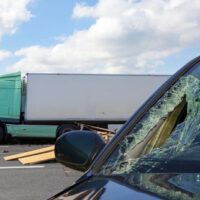The Dangers of Wide Right Turn Truck Accidents

Truck accidents of any type tend to have devastating consequences simply because of the weight and overall size of commercial vehicles. Some of the most commonly reported kinds of truck accidents, however, occur when a truck driver makes a wide right turn. Negligence when making these types of turns is dangerous, as it can result in head-on collisions or side-impact crashes. In some serious cases, cars can even become trapped between the truck in question and the vehicles in the other lane. If you were injured in a truck-related accident, you should consider contacting a trusted and knowledgeable Fort Lauderdale truck accident lawyer who can help you seek compensation for your losses.
Types of Wide Right Turn Truck Accidents
The shape and size of most commercial trucks makes maneuvering those vehicles, especially when turning right, a difficult process. For instance, motorists who operate commercial vehicles must first swing their trucks to the left before making a right hand turn. In fact, the first type of wide right turn collision actually occurs when a truck swings too far to the left when attempting to make a proper right hand turn, as this can cause the truck to actually drift into the left lane itself.
The second type of wide right turn accident instead stems from a driver’s failure to go far enough to the left before actually making a right. Failing to swing left makes it much more likely that a truck will roll over, which are some of the most serious kinds of truck accidents, as they often involve cargo spillage and fires. Alternatively, failing to swing left before making a right turn can cause a truck to veer off the road entirely.
The third, and final type of wide right turn truck accident occurs on roads with two right turn lanes when a truck driver, who is attempting to turn, veers into the second turn lane. Vehicles that are currently in that lane can easily become crushed or trapped by the much larger commercial vehicle.
Driver Negligence
Because wide right turns are so difficult to accomplish in commercial vehicles, Florida truck drivers are specifically instructed on this maneuver when undergoing their CDL application test. Unfortunately, many trucking companies have begun turning to non-licensed drivers during the hiring process, which can have devastating consequences for anyone else who is on the road with the unlicensed truck operator. Truck accidents that can be traced back to a driver’s lack of training or licensing can usually support a liability claim against the trucking company itself for its failure to use reasonable hiring measures.
Trucking companies can also be held liable for accidents caused not by a driver’s negligence, but by improper vehicle maintenance, as these entities are directed under federal law to regularly inspect and repair their vehicles. For this reason, if failed or defective brakes, tires, or a steering mechanism contributed to a wide right turn accident, the driver’s employer could be held liable for damages compensating the injured party for medical bills, lost wages, property damage, and pain and suffering.
Schedule a Free Consultation Today
To learn more about protecting your own legal interests after a truck accident, please call one of the dedicated truck accident lawyers at Boone & Davis today. We can be reached at 954-566-9919, or via online message.
Resource:
flhsmv.gov/handbooks/englishcdlhandbook.pdf
https://www.booneanddavislaw.com/legal-remedies-for-jackknife-accidents/
